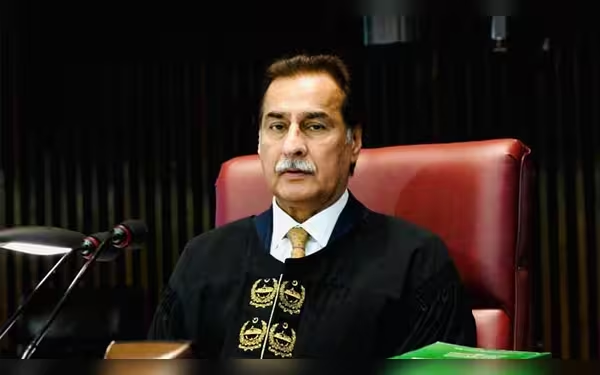Saturday, November 16, 2024 04:48 PM
SC Ruling on Reserved Seats Unenforceable After Election Act Amendments
- SC ruling on reserved seats deemed unenforceable by NA Speaker.
- Recent amendments to Election Act affect political affiliations.
- ECP seeks legal advice on implications of SC's order.
 Image Credits: geo
Image Credits: geoNA Speaker Ayaz Sadiq states SC ruling on reserved seats is unenforceable due to recent Election Act amendments.
In a significant development regarding the political landscape of Pakistan, National Assembly Speaker Ayaz Sadiq has declared that the Supreme Court's ruling on reserved seats is now "incapable of implementation" due to recent amendments made to the Election Act of 2017. This statement comes in the wake of the Supreme Court's clarification on its earlier verdict, which had been perceived as a major victory for the Pakistan Tehreek-e-Insaf (PTI) party, founded by Imran Khan.
On July 12, the Supreme Court issued a ruling that allowed PTI to claim reserved seats for women and non-Muslims in both national and provincial assemblies. This decision overturned a previous order from the Peshawar High Court, which had upheld the Election Commission of Pakistan's (ECP) decision to deny these seats to the Sunni Ittehad Council (SIC). The PTI candidates had participated in the February 8 general elections as independents after losing their electoral symbol, the "bat," due to issues surrounding intra-party elections.
Following the Supreme Court's ruling, the ECP faced challenges in allocating reserved seats. The SIC, which had allied with PTI candidates, was denied these seats because it failed to submit a list of candidates on time. In a letter to the ECP, Sadiq emphasized that the Supreme Court had allowed independent candidates to join political parties, but the situation changed after the parliament passed the Elections (Second Amendment) Act, 2024.
This amendment, which received presidential assent on August 7 and was published in the Gazette of Pakistan on August 9, introduced crucial changes to Sections 66 and 104-A of the Election Act. The amendment to Section 66 states that if a candidate does not declare their political party affiliation before seeking an election symbol, they will be considered an independent candidate. Meanwhile, Section 104-A stipulates that once an independent candidate joins a political party, their declaration is irrevocable.
Moreover, the Amended Election Act has retrospective effects dating back to 2017, meaning that independent candidates who have already joined a political party cannot switch affiliations. Sadiq pointed out that the ECP cannot allocate reserved seats without fully applying the Amended Election Act, which now takes precedence over the Supreme Court's earlier ruling.
In a related development, the ECP has sought legal advice regarding the Supreme Court's order on reserved seats and its implications. The apex court had previously criticized the ECP for its attempts to create confusion surrounding the implementation of the ruling, suggesting that the commission's actions were merely delaying tactics.
As the political situation continues to evolve, the implications of these legal and legislative changes are profound. The amendments to the Election Act not only affect the PTI but also set a precedent for how political affiliations and electoral processes will be managed in the future. This situation underscores the importance of clarity and adherence to legal frameworks in maintaining the integrity of Pakistan's electoral system. As citizens, it is crucial to stay informed about these developments, as they will undoubtedly shape the future of governance and representation in the country.













